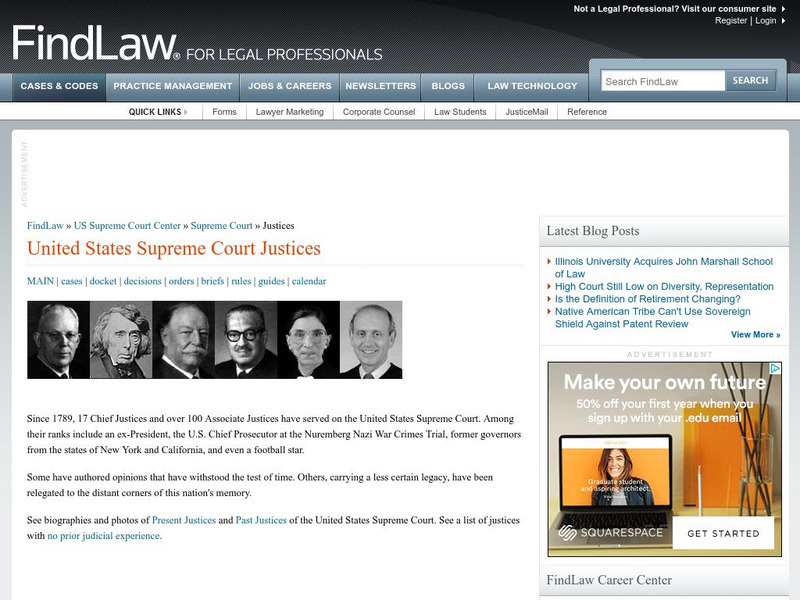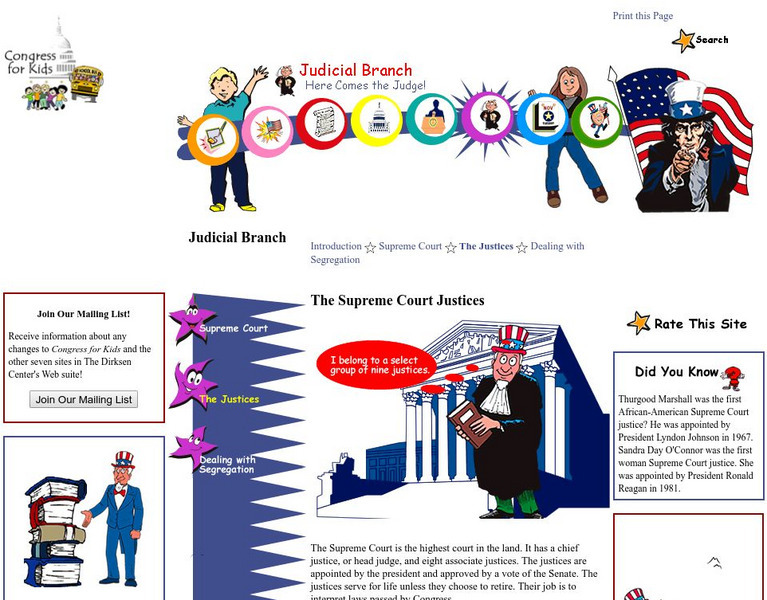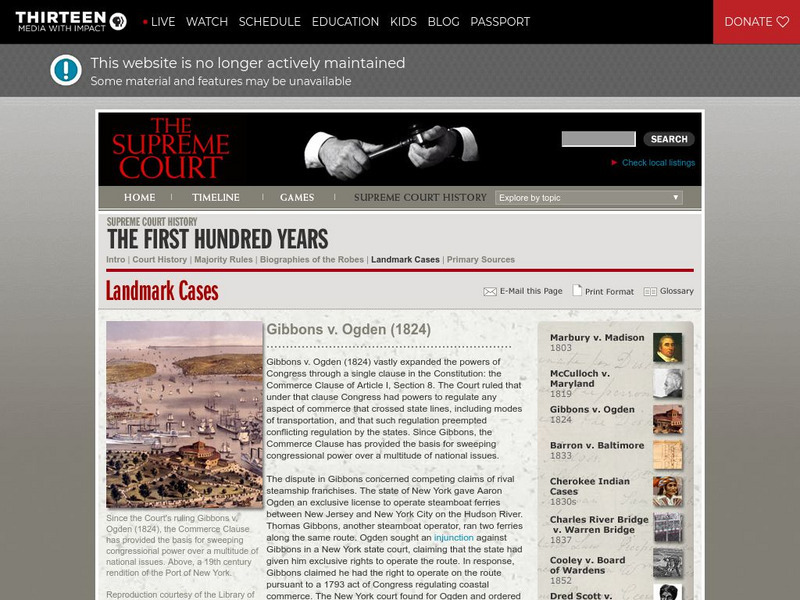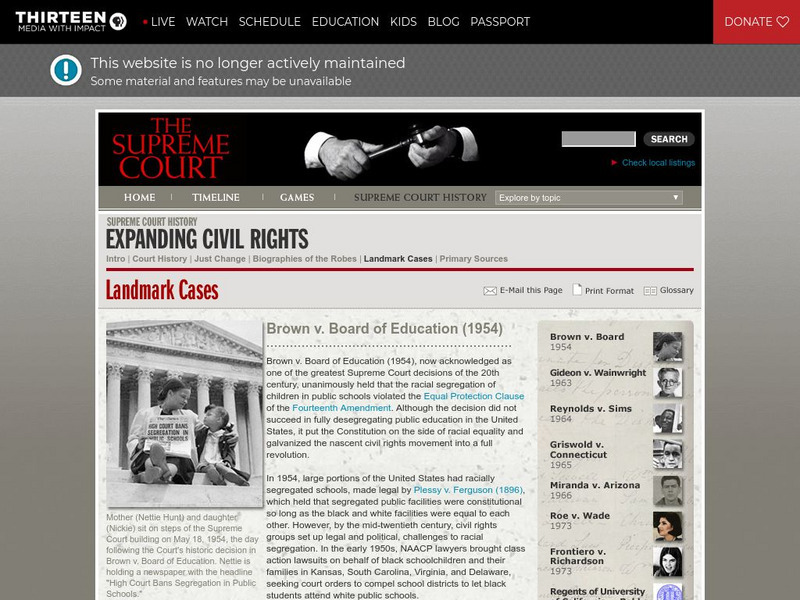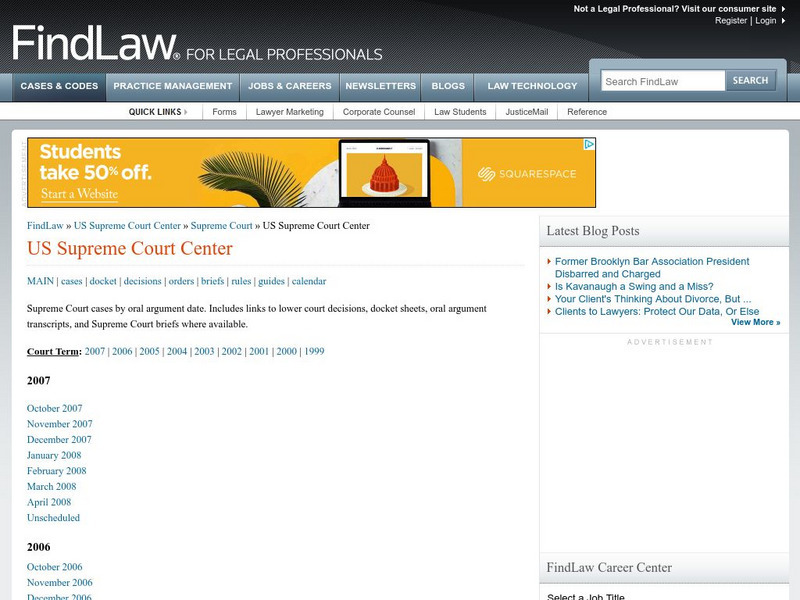Hi, what do you want to do?
CommonLit
Common Lit: American Justice in the Supreme Court
The Supreme Court is the highest court of the United States. It was set up by our Constitution to make important decisions about the law. This article describes how the Supreme Court works, and its impact on American justice. It also...
A&E Television
History.com: Controversial Supreme Court Nominations Through History
Presidents dating back to George Washington have faced opposition to their nominees for the nation's highest court. The justices who sit on the Supreme Court of the United States hold a unique governing power, making their selection...
A&E Television
History.com: Has a u.s. Supreme Court Justice Ever Been Impeached?
Supreme Court justices serve for life, unless they resign, die or are impeached and removed from office. The reason for their lifetime tenure is to enable them to make decisions free from any pressure by the executive or legislative...
National Endowment for the Humanities
Neh: Edsit Ement: The Supreme Court: The Judicial Power of the United States
In this lesson plan, students will consider "The Supreme Court: The Judicial Power of the United States." The plan includes worksheets and other student materials that can be found under the resource tab.
Thomson Reuters
Find Law: u.s. Supreme Court: Gannett Co. V. De Pasquale (1979)
Complete Supreme Court opinion for Gannett Co. V. DePasquale.
Thomson Reuters
Find Law: u.s. Supreme Court: Joseph Burstyn, Inc. V. Wilson (1952)
This resource provides information about the Joseph Burstyn v. Wilson Supreme Court case.
PBS
Wnet: Thirteen: Classroom Interactives: Supreme Court Landmark Case Timeline
Educational interactive activity where users create a timeline of landmark Supreme Court cases. Provides information, facts, and related resources for each case.
PBS
Wnet: Thirteen: The Supreme Court: Landmark Cases: Dred Scott v. Sandford (1857)
PBS features a summary of the landmark Supreme Court case of Dred Scott v. Sanford which ruled that African Americans are not American citizens, and therefore could not sue in federal court. Decision written by Chief Justice Roger B. Taney.
PBS
Wnet: Thirteen: The Supreme Court: Landmark Cases: Schenck v. u.s. (1919)
PBS offers a summary of the landmark Supreme Court case of Schenck v. U.S. which dealt with when an individual's free speech rights under the First Amendment presented a "clear and present danger." This case has since been overturned.
PBS
Wnet: Thirteen: The Supreme Court: Landmark Cases: Marbury v. Madison (1803)
PBS features a summary of the landmark Supreme Court case of Marbury v. Madison, which deals with the principle of "judicial review." Opinion written by Chief Justice John Marshall.
Thomson Reuters
Find Law: Supreme Court Justices
This site acts as a short introduction to the U.S. Supreme Court Justices. Biographies and photos are available for current and past Justices of the Supreme Court through links on this site. From these links more in-depth bios are...
The Dirksen Congressional Center
Congress for Kids Supreme Court Justices
Aimed at younger students who are learning about the Supreme Court and the Justices who are appointed by the President. Briefly covered are the role of the justices, names of well-known justices, and how they serve. A series of learning...
Wyzant
Wyzant: Supreme Court Justice William O. Douglas
Lesson briefly describes the life and work of Supreme Court Justice William O. Douglas.
PBS
Wnet: Thirteen: The Supreme Court: Landmark Cases: Miranda v. Arizona (1966)
PBS presents a summary of the landmark Supreme Court case of Miranda v. Arizona which ruled that a person suspected of a crime must be informed of their constitutional rights before police questioning, becoming known as the "Miranda...
PBS
Wnet: Thirteen: The Supreme Court: Landmark Cases: Gibbons v. Ogden (1824)
PBS features a summary of the landmark Supreme Court case of Gibbons v. Ogden which dealt with congressional powers through the Commerce Clause of Article I, Section 8. Decision written by Chief Justice John Marshall.
iCivics
I Civics: Supreme Court Nominations
This lesson teaches the fundamentals of Supreme Court Justice nominations and helps students understand the politics behind the nominations.
Alabama Learning Exchange
Alex: The United States Supreme Court: Published Opinions
Young scholars will read and analyze published opinions of the United States Supreme Court to determine the type of opinions issued by the court. Students will select a justice and attempt to determine that justice's ideology as they...
PBS
Wnet: Thirteen: Supreme Court: Expanding Civil Rights: Brown v. Board of Education
This is a detailed overview of the landmark Supreme Court case of Brown v. Board of Education which held that the racial segregation of children in public schools violated the Equal Protection Clause of the Fourteenth Amendment. The...
PBS
Wnet: Thirteen: The Supreme Court: Landmark Cases: Griswold v. Connecticut (1965)
PBS provides a detailed overview of the landmark Supreme Court case of Griswold v. Connecticut which dealt with the right to marital privacy. The opinion was written by Justice William Douglas.
PBS
Wnet: Thirteen: Classroom Interactives: Supreme Court Concentration
Discover interesting facts about Supreme Court justices throughout history in this interactive matching activity.
PBS
Pbs: How the Supreme Court Affects the Lives of Teens (Lesson Plan)
Objectives for this lesson include describing the structure and function of the Supreme Court, looking at important decisions, and discussing recent rulings and issues.
Thomson Reuters
Find Law: Supreme Court Center
FindLaw provides the following information on the Supreme Court: The docket, cases, decisions since 1893, orders, briefs, court rules, court filing guides, and calendar.
The Dirksen Congressional Center
Congress for Kids: The Supreme Court
The Dirksen Center provides a page of excellent links to information about the Supreme Court including information on Brown v. Board of Education, the Constitution test, a dual court system, equal protection, supreme court judges, the...
Other
Certiorari Practice: The Supreme Court's Shrinking Docket
Recent legislation has allowed the Supreme Court discretionary, rather than obligatory powers, in deciding which cases to decide. This in-depth and well-developed essay describes the process and criticizes the new system, while providing...
Other popular searches
- Supreme Court Cases
- Supreme Court Case Studies
- Supreme Court Justices
- The Supreme Court
- Landmark Supreme Court Cases
- Supreme Court Decisions
- Supreme Court Rulings
- Corporations Supreme Court
- Writing Lesson Supreme Court
- Michigan Supreme Court
- Supreme Court Nominations
- Famous Supreme Court Cases













